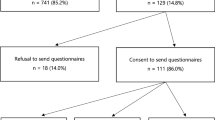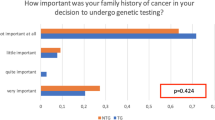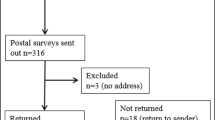Abstract
Introduction: Carriers of a hereditary mutation in BRCA are at high risk for breast and ovarian cancer. The first person from a family known to carry the mutation, the index person, has to share genetic information with relatives. This study is aimed at determining the number of relatives tested for a BRCA mutation, and the exploration of facilitating and debilitating factors in the transmission of genetic information from index patient to relatives. Methods: The study includes 50 female index patients, with a germline mutation in either BRCA1 or BRCA2. Results: The percentage of first- and second-degree relatives tested for the BRCA-mutation was 36%. Uptake levels for predictive BRCA-mutation testing could not be explained by demographic or counseling characteristics, nor by cancer-related history. In 14 families, fewer than 20% of first- and second-degree relatives were tested. These families were compared with the other families. In retrospect, the index patients of families with few BRCA-mutation tests more often asked for support in the communication with family members (62% vs. 27%). A psychosocial worker had been absent more often during counseling (39% vs. 9%). Emotional factors debilitating the information transmission were only reported by index patients from families with few BRCA-mutation tests (18% vs. 0%), who also informed their parents less often (21% vs. 67%) and did so less often personally (38% vs. 71%). Conclusion: Uptake of predictive BRCA-mutation testing by first- and second-degree relatives is low. Emotional and behavioral factors of index patients are related to this uptake.
Similar content being viewed by others
References
AC DudokdeWit A Tibben PG Frets et al. (1997) ArticleTitleBRCA1 in the family: a case description of the psychological implications Am J Med Genet 71 63–71 Occurrence Handle10.1002/(SICI)1096-8628(19970711)71:1<63::AID-AJMG12>3.0.CO;2-T Occurrence Handle1:STN:280:ByiA2MfmslE%3D Occurrence Handle9215771
E Claes G Evers-Kiebooms A Boogaerts et al. (2003) ArticleTitleCommunication with close and distant relatives in the context of genetic testing for hereditary breast and ovarian cancer in cancer patients Am J Med Genet 116 11–9 Occurrence Handle10.1002/ajmg.a.10868
J Speice SH McDaniel PT Rowley S Loader (2002) ArticleTitleFamily issues in a psychoeducation group for women with a BRCA mutation Clin Genet 62 121–7 Occurrence Handle10.1034/j.1399-0004.2002.620204.x Occurrence Handle1:STN:280:DC%2BD38vntFKjtw%3D%3D Occurrence Handle12220449
EMA Bleiker NK Aaronson FH Menko et al. (1997) ArticleTitleGenetic counseling for hereditary cancer: a pilot study on experiences of patients and family members Pat Educ Couns 32 107–16 Occurrence Handle10.1016/S0738-3991(97)00067-0 Occurrence Handle1:STN:280:DyaK1c%2FhslaisA%3D%3D
MH Linden Particlevan der (2000) ArticleTitlePsychosocial counseling after diagnosis for non-carriers of hereditary breast cancer or ovarian cancer; is it needed? Ned Tijdschr Geneesk 144 2381–4
L Lodder PG Frets RW Trijsburg et al. (2001) ArticleTitlePsychological impact of receiving a BRCA1/BRCA2 test result Am J Med Genet 98 15–24 Occurrence Handle10.1002/1096-8628(20010101)98:1<15::AID-AJMG1014>3.0.CO;2-0 Occurrence Handle1:STN:280:DC%2BD3MzmsFClsw%3D%3D Occurrence Handle11426450
C Lerman RT Croyle (1996) ArticleTitleEmotional and behavioral responses to genetic testing for susceptibility to cancer Oncology (Huntingt) 10 191–5 Occurrence Handle1:STN:280:BymH3srjslE%3D
RT Croyle C Lerman (1999) ArticleTitleRisk communication in genetic testing for cancer susceptibility J Natl Cancer Inst Monogr 25 59–66 Occurrence Handle10854459
J Green M Richards F Murton et al. (1997) ArticleTitleFamily communication and genetic counseling: The case of hereditary breast and ovarian cancer J Genetic Couns 6 45–60 Occurrence Handle10.1023/A:1025611818643
N Hallowell F Murton (1998) ArticleTitleThe value of written summaries of genetic consultations Pat Educ Couns 35 27–34 Occurrence Handle10.1016/S0738-3991(98)00080-9 Occurrence Handle1:STN:280:DyaK1M%2FltVSrug%3D%3D
MPM Richards (1999) ArticleTitleGenetic counseling for those with a family history of breast and ovarian cancer Current practice and ethical issues. Acta Oncol 38 559–65 Occurrence Handle1:STN:280:DyaK1MzlsVyqtQ%3D%3D
LM Koehly SK Peterson BG Watts et al. (2003) ArticleTitleA social network analysis of communication about Hereditary Nonpolyposis Colorectal Cancer genetic testing and family functioning Canc Epid Biom Prev 12 304–13
Author information
Authors and Affiliations
Corresponding author
Rights and permissions
About this article
Cite this article
Landsbergen, K., Verhaak, C., Kraaimaat, F. et al. Genetic uptake in BRCA-mutation families is related to emotional and behavioral communication characteristics of index patients. Familial Cancer 4, 115–119 (2005). https://doi.org/10.1007/s10689-004-7991-2
Received:
Accepted:
Issue Date:
DOI: https://doi.org/10.1007/s10689-004-7991-2




